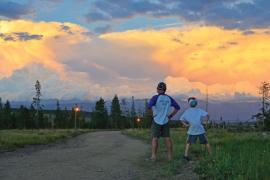Despite my more than forty years in organized camping, I have scant experience in the other kind. In fact, one of my few forays into the world of site camping — accompanied by a long-time camp friend — resulted in a frighteningly hilarious expose of how not to assemble a tent. So much for our combined expertise in the great outdoors. Maybe we should have enrolled in that pioneering mod after all.Then there’s the hiking part. My virgin attempt at scaling the heights of a rather foreboding central Pennsylvania mountain came just under two months of the four-year mark of my arrival in the Susquehanna Valley, home to two universities where I would earn my educational stripes over a seven-year period. The occasion was Senior Week, and a few friends and I decided it was time to tackle the promenade we had been staring at for such a long time.
Though we lost valuable gear inappro¬priately packed for our climb (including, tragically, the cinnamon Pop Tarts we brought for breakfast), our journey up the mountain proved less arduous than the somewhat helter-skelter plunge back down. What lay in between was a cool May night huddled around a hastily made campfire — perhaps the one camping mile¬stone conducted with great alacrity and success — and the spectacular west-facing river views emerging at dawn. It was only later that I even considered what might have been the view from the other side.
Change Is Good
As we close out 2011, my thoughts have already turned to 2012 . . . the ninety-first season of camp at Cape Cod Sea Camps. Tracing our history, it’s impossible to ignore our founder’s fundamental belief that “change is good.” Like many of his pioneering peers and predecessors, Robert J. Delahanty was a visionary, even though he had an understated, common-sense approach to caring for his kids. (“Anything for the boys,” he was known to say.) After all, change is good.
At a recent camper’s high school gradu¬ation, a speaker recalled the popular yearbook inscription of the 1960s and 70s — “don’t ever change” — and challenged the notion that anybody really meant that at all. Rather, he offered that perhaps the intent was intended to reflect on the spirit, character, and overall dispo¬sition of the friend for whom the message was invoked, not some underlying wish that a high school classmate remain exactly as he or she might be on commencement day. That would be stifling.
Views on Summer Camp for 2012
In considering whether the same sentiment might apply to the industry of summer camp, I can’t help but wonder what changes the future will hold — particularly as we endure the buffering from an evolving parent-child culture that bodes for later-age enrollment, shorter stays, increased communication, and greater parent involvement.Can such seismic shifts be so bad?
The short answer is yes . . . if we fail to adapt and adjust to the changing interests and prerogatives of our customers — parents and campers alike.
It has been with that in mind that our camp — from the days of its founding — has not only embraced change, but sought it out, even in the face of skepticism. Our diversified “product line” has served us well throughout tight economic times. And while a ten-day camp was certainly not what Mr. Delahanty (or “Captain Del,” as he was known to generations of campers and staff) had in mind, that, along with an innovative “sleepover day camp” (which I’ll explain later), early-to-the-game coeducational programming, innovative activity offerings, and, gasp, new cell phone policies have helped us to launch, rather than limp, into the future of summer camp.
The Other Side of the Mountain
This brings me back to my mountain in central Pennsylvania. What was that view from the other side? I don’t know. We never ventured far enough over the peak to find out. Sad, because we were so close. Unfortunate, because it may have been even better.
Camp, like mountain climbing, can be short-sighted and predictable. It is only when we venture beyond our comfortable, scenic boundaries that we can fully appreciate whether another view might offer a different perspective that, in turn, might better prepare our passions, our properties, and our programs for success in a rapidly changing world.
The Digital Divide
In the blink of an eye, advances in technology have changed the social environment in which our kids are living — and changed the relationships between parents and children. It’s no wonder then that these changes, despite our considered resistance, have encroached upon our camps, forcing hard choices as we debate and set policies regarding cell phones, Internet access, and use of social networking sites.
Indeed, the digital age has ushered in a number of new challenges for camps intent on maintaining distance from home, preferring that campers focus their atten¬tions internally as opposed to externally. Our camp policy states: “The culture and community we aim to establish at camp is different from home, school, college, or the family vacation. In order to achieve our goals and provide a unique experience in the camp setting, we need to establish guidelines that reinforce and preserve this culture. We are fortunate that we don’t always have to bow to all forms of social and technological pressures. We can still provide an experience where campers don’t spend hours playing video games, instant messaging, or watching television. Instead, campers play actively, create excitement through creativity, write and sing songs, make friends face to face, and walk hand in hand through camp, totally absorbed in what is happening in our little world on the shores of Cape Cod Bay.”
Can You Hear Me Now?
The unpopularity of such policies among youth, particularly teens, and the lack of support among many parents (stories of mom or dad equipping kids with “dummy” phones to hand in or back-up ones should they get caught with one are rampant) have engendered reconsideration on our part of the wisdom of a total ban on cell phone use among our teen campers. Of course, safety plays a role, too.
As for the first part, it occurred to me that we began by losing the battles. And then we lost the war. With parents denying their children were packing cell phones in front of their kids, it became increasingly, and painfully, obvious that parental co-conspirators — perhaps unwittingly — were undermining respect for many of our other rules. After all, the pruning going on in teen brains means they aren’t always well equipped to parse through the nuances of which rules are deemed important and which ones aren’t. (Translation: if it’s okay with Mom for me to have a cell phone, why wouldn’t it be okay for me to violate curfew?)
Secondly, numerous public forays by this particular group argue for an added safety measure of cell phone access, supplementing on-duty and circulating staff, check points, and availability of landline phones in stores and restaurants.
So far, so good.
Teen phones are kept in a secure, charge¬able location and are distributed by staff for occasional and supervised social use (voice and text only) and for emergency use only on off-campus excursions. While our new policy is a work in progress, it has certainly yielded a robust crop of cell phones that might otherwise have remained hidden in the bottom of trunks or under pillows.
Campers AwayYears ago, our camp sought to expand our “product” line by offering different lengths-of-stay at both our overnight and day camps. First labeled “Campers-a-Weigh” and “Days-a-Weigh” to reflect our nautical heritage, numerous inquiries about our options for weight-challenged children prompted yet another change, albeit not a particularly noteworthy one (switching the name to Days-a-Way, a four-night sleepover option for day campers). What was important, however, was recognition of the shifting nature of parental preferences — particularly regarding length of stay.
With parenting styles shifting ever-so-slowly from traditional “authoritarian” approaches (my way or the highway) to “authoritative” ones (partnership), many children have become their parents’ best friends! Within reason, this is not necessarily an unhealthy development, but it does mean that, in many cases, mom and dad are more reluctant than ever to part with their “buddies” for more than a brief period of time, if at all. These changes necessarily create pressure for camps to add options for shorter camp stays, especially for younger children, who seem increasingly more difficult to attract. (For more information on parent¬ing styles, see my article “Confessions of a Disciplinarian,” in the May/June 2010 Camping Magazine.)
Yours, Mine, or Ours?
At a recent camp conference, I attended a roundtable discussion of mostly seasoned camp directors at which we were challenged on the notion that decreasing camp enrollments were a result of the uncertain economic times. The alternative hypothesis? That in our rush, as an industry, to demonstrate proven effective outcomes of the summer camp experience we have inadvertently sent the message to parents that “your child is better off with us than with you.” The theory then has it that parents are pushing back, once again telling us more through actions than words that their children, their buddies, are best left largely with them.
If a marketing muddle has ensued, perhaps it’s best to retreat to the “It Takes a Village” model, truly finding ways to envelop parents in the fabric of what we do by creating opportunities to honestly engage in a parenting partnership that stresses our common desires and hopes for the nurturing and education of their children. Like it or not, few parents today simply drop their kids and leave to return only on visiting day or closing day. Rather, they want to stay involved, need to stay in touch, and frankly, have a lot to offer by way of supporting and supplementing our work — just as we do theirs.
A Different Perspective
A common morning assembly trick at camp is to highlight the value of new perspectives on commonly held beliefs or traditions by having audience members turn around on the benches in order to face the speaker, now standing in the back of the theater or assembly space. It’s helpful for more tactile learners. The same might be true of us as well. If we venture higher up the mountain of summer camp opportunities we create and share with others, perhaps a different vista will await with a plethora of new ideas to stay exceedingly relevant in a changing-so-fast-it-makes-your-head-spin world.
As Andy Rooney famously noted, “I’ve learned that everyone wants to live on top of the mountain, but all the happiness and growth occurs while you’re climbing it.”
References
ACA. (2005). Directions: Youth development, outcomes of the camp experience. Retrieved from www.ACAcamps.org/research/enhance/directions
Wallace, S. (2008). Reality gap. New York, NY: Union Square Press/Sterling Publishing.
Stephen Wallace, M.S. Ed., has broad experience as a school psychologist and adolescent counselor. He serves as director of counseling and counselor training at the Cape Cod Sea Camps, senior advisor for policy, research, and education at SADD (Students Against Destructive Decisions), and as an adjunct professor of psychology and human services. For more of Stephen’s articles, visit www.ACAcamps.org/campmag and www.CampParents.org. For more information about Stephen’s work, visit www.stephengraywallace.com.
© Summit Communications Management Corporation 2011 All Rights Reserved.
Originally published in the 2011 November/December Camping Magazine.


